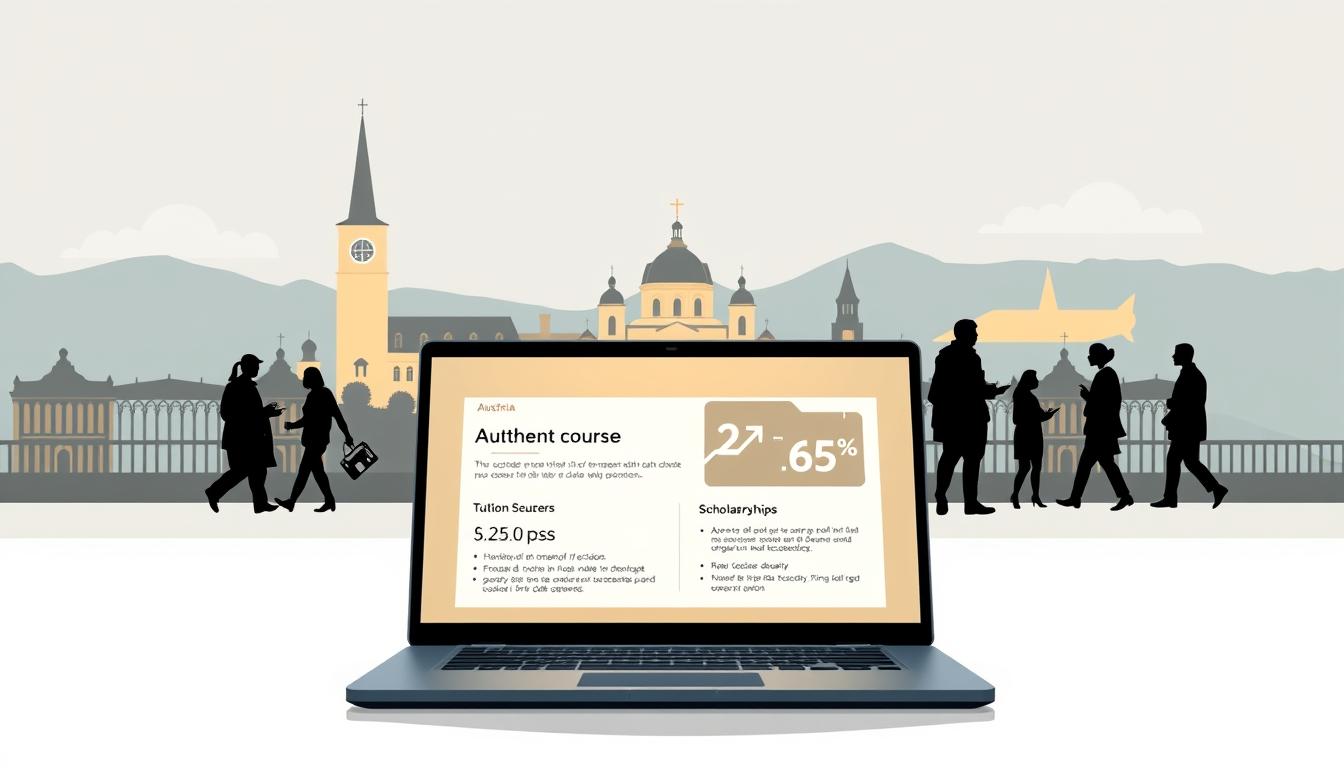Data Science Courses in Austria are very popular. They offer top-notch education for future experts. This guide will help you understand tuition fees, requirements, and scholarships. It’s perfect for students or career seekers looking to plan their studies.
This article covers all the important details. You’ll learn about program costs and how to apply. Scholarships can help reduce expenses, and we’ll explain what qualifications you need. Austria’s programs mix theory with practical skills, making education both affordable and valuable.
Key Takeaways
- Understand tuition fees for Data Science Courses in Austria.
- Learn entry requirements for top programs.
- Explore scholarships that reduce study costs.
- Discover program structures and academic support options.
- Get tips to apply for scholarships and meet deadlines.
Introduction to Data Science Education in Austria
Data Science is changing the world, and Austria is at the forefront. Its universities offer courses that mix theory with practical tech skills. This makes them leaders globally. The best Data Science Course in Austria combines the latest research with hands-on training, drawing students from everywhere.
The Rise of Data Science in Modern Academia
Today, universities focus on data-driven learning. In Austria, places like TU Wien and Graz University of Technology include AI and machine learning in their courses. Students also get internships with big names like Siemens or SAP, linking school to work.
This focus on practical learning makes Austria a prime spot for data science students.
Academic Innovations Driving the Field
Austria’s programs stand out with innovations like cloud-based labs and big data analytics courses. For example, the University of Vienna offers January intake options for flexible entry, even without IELTS scores. Partnerships with tech centers in Vienna and Linz give students real-world experience.
These efforts make Austria a key place for data science education.
Programs also focus on ethics and AI governance, readying graduates for global issues. With a focus on innovation and access, Austria’s data science courses are shaping the future of tech education.
Tuition Fees Structure for Data Science Programs
When looking at Data Science programs in Austria, it’s important to know the difference between public and private schools. Public universities usually charge less, with lower fees for EU students. Private programs, on the other hand, might cost more. It’s essential to compare prices to plan your budget.
| Institution Type | Annual Tuition (Approx.) | Notes |
|---|---|---|
| Public Universities | €300–€700 (EU/EEA) €3,000–€5,000 (Non-EU) |
Lower fees for EU residents |
| Private Institutions | €8,000–€18,000 | Includes additional services like career support |
Program length and study pace also play a role in total costs. Part-time studies might lower annual fees but extend the program length. Many programs offer payment plans to help with costs. Some public schools are raising non-EU fees due to funding changes.
- Public programs often prioritize EU students with subsidized rates.
- Private institutions may bundle costs for lab access and certifications.
- Check for scholarships tied to tuition reductions before finalizing choices.
Start researching tuition fees early to find a program that fits your budget. Public schools like TU Wien and JKU Linz are more affordable. Private schools like FHTW offer specialized programs at a higher cost. By comparing these options, you can find a balance between cost and quality.
Admissions and Requirements for Prospective Students
Getting into an affordable Data Science Course Austria means knowing the admission rules. Schools like Danube University Krems make it clear and easy. They make sure students have the basics and keep costs low.
Eligibility Criteria and Prerequisites
First, you need to meet some basic requirements:
- Have a background in STEM or similar fields
- Be good at English (TOEFL 80+ or IELTS 6.0)
- Have strong math and programming skills
Essential Documentation and Deadlines
Here’s what you need for a full application:
| Document | Details |
|---|---|
| Transcripts | Certified copies of all academic records |
| Language tests | Official scores from test providers |
| Financial proof | Bank statements showing €6,000 annual support |
| Statement of purpose | 500-word career goals essay |
Application deadlines are usually between January 15 and May 1. Even if you’re late, Danube University Krems might accept you through rolling admissions. Apply early to get scholarships and make the visa process easier.
Scholarship Opportunities for Data Science Studies
Getting financial help is important when you plan to study Data Science in Austria. There are many scholarships in Austria to help with tuition and living expenses. Both public and private groups offer special help for data science students.

Government and Institutional Scholarships
The OeAD (Austrian Exchange Service) offers grants based on merit for international students. Schools like TU Wien and FH OÖ also have scholarships for data science students. You need good grades and a clear plan for your future in tech or research.
- OeAD Scholarships: Focus on STEM fields, including data science.
- TU Wien Excellence Grants: Awarded to top-ranked applicants.
Private Funding and Grants
Private companies and foundations in Austria also help students. For example, Siemens and BCG fund research projects with universities. Some grants are for women in tech or those studying sustainability.
“My Siemens grant allowed me to specialize in AI ethics while studying data science. It’s life-changing support.”
Applying usually means writing essays or proposing projects. Look for deadlines on university and company websites. Getting more than one scholarship can really cut down costs, making study Data Science in Austria more affordable.
Navigating Financial Aid and Grants in Austria
Understanding eligibility for Data Science Course Austria means knowing about financial help. This aid covers costs like tuition and living expenses. Let’s look at how to get these resources.
Types of Financial Aid Available
There are many grants and scholarships for different needs. Here are some main ones:
| Type | Amount | Criteria |
|---|---|---|
| Merit-Based Scholarships | Up to €1,000 | Academic excellence |
| Need-Based Aid | Up to €2,000 | Financial need assessment |
| Research Grants | Up to €3,000 | Proposed research relevance |
Application Tips and Best Practices
- Check eligibility for Data Science Course Austria on official sites.
- Apply early to avoid missing deadlines.
- Make your application stand out with special skills.
For more on tuition and scholarships, check Alpen-Adria-Universität Klagenfurt’s details. Financial aid teams can give you personal advice. Don’t hesitate to ask for help.
Comparing Top Data Science Programs in Austria
Choosing the right Data Science program in Austria means looking at tuition costs and career support. Many universities offer financial aid for Data Science Course Austria, making it easier to get an education. Start by checking tuition fees: EU students pay €0 to €363.36 per semester. Non-EU students pay up to €2,449.60. Scholarships can also help lower costs.
- Tuition Costs: Make sure the program fits your budget. Some universities have partnerships for financial aid for Data Science Course Austria.
- Faculty Expertise: Look for programs led by experts in AI and machine learning.
- Career Support: Top programs offer internships and job placement services.
Programs like those at Graz University of Technology and TU Wien are known for research opportunities. For more on scholarships, check Kadamboverseas’ guide. Compare curriculum depth, lab access, and alumni success rates. Programs with practical training often lead to better job outcomes. Don’t forget to review deadlines and required documents like transcripts and language proficiency proofs. Making an informed choice ensures you find the best fit for your goals.
Exploring Affordable Data Science Courses
Looking for a Data Science Course in Austria cost-friendly option? You don’t have to give up quality. Many schools offer programs that are affordable but don’t skimp on learning. Check out public universities like TU Wien or the University of Vienna. Their tuition is much lower than private schools.
Public programs focus on making education accessible. This makes them perfect for those watching their budget.
Cost-Effective Program Options
- TU Wien Data Science Track: €363.36/semester (EU students) + minimal admin fees
- JKU Linz Part-Time Programs: Flexible schedules with reduced tuition rates
- Government-funded Scholarships: Up to 70% tuition waivers for qualifying applicants
| University | Annual Cost | Special Features |
|---|---|---|
| University of Vienna | €726.72/year | EU/EEA tuition fees |
| Vienna University of Economics | €2,200/year | Industry partnerships |
| Private Institutes | €8,000–12,000/year | Shorter program durations |
Budget Planning for Students
Planning your Data Science Course in Austria cost is key. Here’s how:
- Apply for early-bird tuition discounts at institutions like TU Graz
- Combine studies with part-time roles in Austria’s tech hubs
- Use budget apps like Money Lover to track expenses
“Austria’s public universities offer some of Europe’s most accessible data science education paths.”
Enhancing Your Skills Through Data Science Labs
Data Science Labs are where theory meets real-world challenges. Austrian universities create labs to improve problem-solving skills. They use collaborative projects and advanced tools.
These environments mimic industry scenarios. Students analyze datasets, build models, and present solutions.
Practical Training and Hands-on Experience
Labs focus on:
- Machine learning experiments with Python and R
- Big data processing using Hadoop and Spark
- Case studies from healthcare, finance, and tech sectors
Research Opportunities in Data Science
Students can join ongoing research in areas like AI ethics or predictive analytics. Universities partner with firms like Siemens and IBM for joint projects. The University of Basel offers lab modules tied to its Master’s program.
This program blends coursework with lab work. It helps build portfolio-ready projects.
Labs also host guest lectures by industry experts and hackathons. Participating boosts your resume and opens internship doors. You can track your progress through lab reports and peer reviews.
Data Science Course in Austria tuition fees, requirements, scholarship
Choosing the right data science program is more than just looking at tuition. In Austria, there are hidden costs that affect your budget.
- Living costs in cities like Vienna add 800–1,200€/month to budgets
- EU students pay no tuition at public universities, while non-EU fees range 3,636€–6,636€ annually
- Scholarships like the OeAD fund tuition and living expenses for international scholars
A Holistic Look at Admissions Processes reveals programs prioritize:
- Technical portfolios showing coding projects
- Math skills through calculus and statistics exams
- English language scores (min IELTS 6.5)
Top schools like TU Wien and TU Graz use a mix of evaluations. They look at transcripts, interviews, and project assessments. Also, 70% of scholarships need proof of financial need and academic merit.
Best Practices for Course Selection in Austria
Choosing the right Data Science Course in Austria begins with clear goals. Think about what skills and career paths you want. Here’s how to narrow down options:
- Check university websites for program details. Look for courses at TU Wien or Graz University of Technology that match your interests.
- Review course syllabi. Focus on modules like machine learning or big data analytics to ensure they align with your goals.
- Ask about career support. Top schools like the University of Vienna often offer internship links and job fairs.
- Talk to current students. Join online forums or attend virtual info sessions to hear real experiences.
- Compare long-term value. Weigh tuition costs against graduate employment rates and industry partnerships.
A strong Data Science Course in Austria should prepare you for roles in tech, finance, or healthcare. Look for programs that balance theory with hands-on projects. This builds the skills employers need.
Preparing for a Successful Data Science Career
To succeed in Austria’s data science job market, focus on technical skills and real-world experience. Here’s how to make your classroom knowledge useful for your career.
Developing Critical Technical Skills
- Master core languages like Python and R for data analysis and machine learning.
- Learn tools such as TensorFlow, Tableau, and Apache Spark to handle complex datasets.
- Pursue certifications from platforms like AWS or Coursera to validate skills employers seek.
Exploring Internship and Networking Opportunities
- Secure internships at Siemens, Ericsson, or Vienna’s tech startups to apply classroom learning.
- Attend events like the Vienna Data Science Summit to connect with industry leaders.
- Join LinkedIn groups or local meetups like the Austrian Data Science Network for mentorship and job alerts.
Combining academic knowledge with practical experience prepares you for challenges in healthcare and finance. Start early—networking and skill-building now pay off later.
Life as a Data Science Student in Austria
Studying data science in Austria is a mix of hard work and cultural fun. Places like TU Wien and Graz University of Technology have top-notch labs and team projects. Classes combine theory with coding, giving you real-world experience.

Vienna’s coffeehouses and Salzburg’s festivals are great places to take a break. Many students join tech clubs or go to AI meetups. “Balancing coding sprints with Alpine hikes keeps life dynamic,” one student said. Austria’s public transport is cheap, making it easy to explore cities like Linz or Innsbruck.
- Academic Calendar: Semesters match the EU schedule, ending in July
- Social Life: Clubs like Data Austria host networking events
- Cost of Living: $800–$1,200/month in most cities
Living costs depend on where you are. Universities work with local companies for internships, helping you find jobs. Free German courses help you fit in. From machine learning events in Vienna to skiing, Austrian student life is a mix of tech and tradition.
| City | Key Universities | Cultural Highlights |
|---|---|---|
| Vienna | TU Wien, TU Graz | Vienna State Opera, Prater Park |
| Graz | University of Graz | Schloss Eggenberg, Styriarte Festival |
| Linz | JKU Linz | Ars Electronica Center, Pöstlingberg Hill |
Conclusion
Choosing a Data Science course in Austria opens doors to top-notch education and job chances. This guide covered important points to help you plan your studies. Programs here mix technical skills with real-world projects, getting students ready for jobs in tech, finance, and research.
Universities like TU Wien and JKU Linz have strong programs backed by industry partnerships. This ensures students learn in-demand skills. Scholarships from the Austrian Academic Exchange Service and private grants help with costs. Make sure to check who can apply and when to apply early.
Career services at places like the Vienna University of Economics help find internships at big companies like Siemens or IBM. This connects your studies to real jobs. Austria’s data science field is all about innovation.
By picking courses that match your goals and using support systems, you’ll set yourself up for success. Look into programs, apply for aid, and connect with others. Your path to becoming a data pro begins here. Start exploring now and take the first step towards a fulfilling career in this growing field.
FAQ
What are the tuition fees for Data Science courses in Austria?
Tuition fees for Data Science programs in Austria vary. Public universities charge between €1,000 to €5,000 per year. Private institutions may cost more than €10,000 annually. It’s best to check each program for specific details.
What are the requirements for applying to Data Science courses in Austria?
You need a bachelor’s degree in a related field, like mathematics or computer science. You might also need specific coursework, a statement of purpose, and letters of recommendation. Always check the specific program for any unique requirements.
Are there any scholarship opportunities available for studying Data Science in Austria?
Yes! There are government and institutional scholarships for international students. You can also find private funding and grants. Research programs like the Austrian Development Cooperation or specific university scholarship programs to find financial assistance that fits your needs.
What is the eligibility for Data Science courses in Austria?
You need a completed bachelor’s degree and sometimes specific coursework in mathematics or programming. Each program may have additional requirements, so it’s important to review their guidelines thoroughly.
Can I get financial aid for Data Science courses in Austria?
Absolutely! Many institutions offer financial aid, including loans, grants, and work-study options. It’s advisable to contact the university’s financial aid office to explore available options tailored to your situation.
How can I find the best Data Science courses in Austria?
Research universities with recognized Data Science programs. Look for rankings, program reviews, faculty expertise, and available resources. Consider factors like curriculum depth, practical training components, and network opportunities as well.
Are there affordable Data Science courses available in Austria?
Yes, several public universities offer affordable Data Science programs with lower tuition fees. It’s important to compare costs and look for scholarship opportunities to make your education in Austria more budget-friendly.
What are the typical costs associated with studying Data Science in Austria?
Students should consider living expenses, books, health insurance, and travel costs. On average, living expenses in Austria can range from €800 to €1,200 per month, depending on the city and lifestyle.
How can I prepare for a successful Data Science career after my studies?
Focus on developing critical technical skills during your course. Seek internships for practical experience and engage in networking opportunities within the industry. These steps can significantly enhance your career prospects in the field of Data Science.


